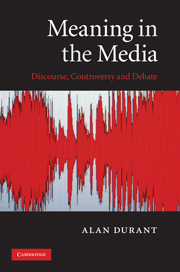Book contents
Introduction
Published online by Cambridge University Press: 05 June 2012
Summary
They shouldn't be allowed to get away with saying that. It's misleading, obscene, defamatory, inflammatory, blasphemous, malicious, intrusive, disrespectful or deceitful. Or alternatively, reflecting a number of newer categories of alleged communicative disorder, something might be considered to be ‘edited in a misleading or dishonest way’ (of a broadcast documentary). Or it could be ‘glorifying’ (of a statement referring to a terrorist incident or campaign). Most days some dispute about media discourse forces its way into public consciousness on one or other of these grounds. Disputes along such lines have become an almost continuous, reflexive dimension of meaning in the media. Allegations rarely go undefended. You've misunderstood, there was a legitimate public interest, it can be shown to be true, this was reasonable comment in the circumstances, no offence was intended.
Contestation of media communication is part of everyday modern life. In many cases quarrels blow over as quickly as they blew up, made irrelevant by subsequent events. But this is not always what happens.
Sometimes interpretive disputes drag on as major public controversies. As well as having their own momentum, they become defining reference points in public thinking about what communication is, almost as much as public thinking about the subject matter communicated. This was the case with Salman Rushdie's novel The Satanic Verses, which ignited worldwide controversy following the book's publication in September 1988 and the fatwa imposed by Ayatollah Khomeini of Iran five months later.
- Type
- Chapter
- Information
- Meaning in the MediaDiscourse, Controversy and Debate, pp. 1 - 16Publisher: Cambridge University PressPrint publication year: 2010



